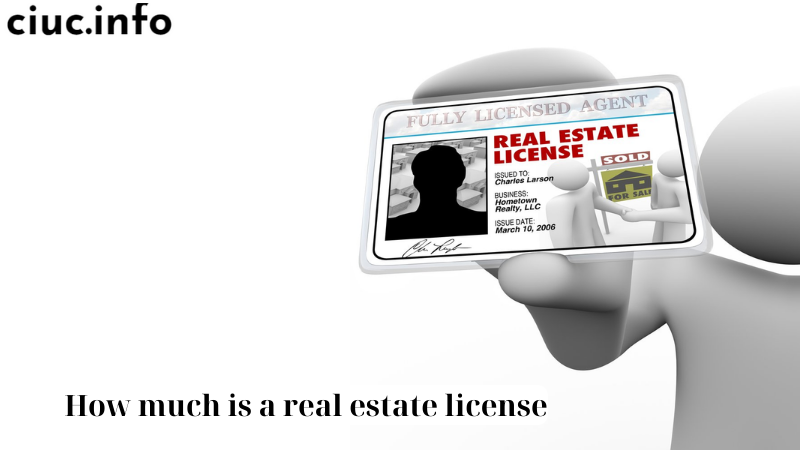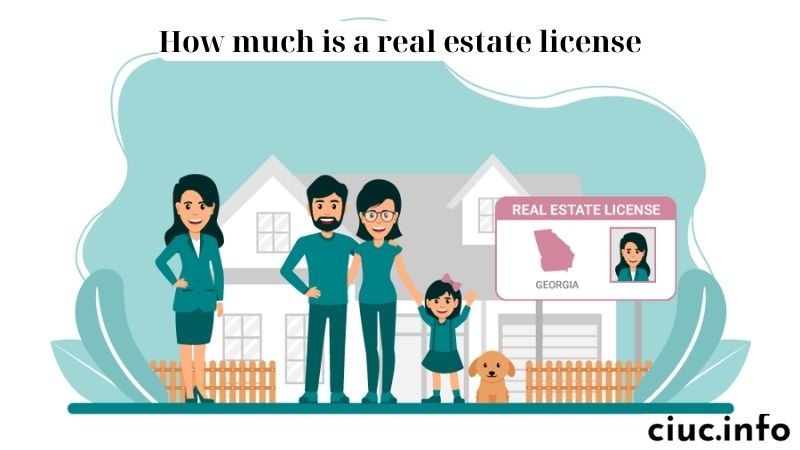How much is a real estate license? The real estate industry, with its ever-fluctuating markets and boundless potential for growth, has long been an attractive field for aspiring professionals seeking lucrative careers. Yet, amidst the allure of hefty commissions and the promise of financial independence, lies a crucial stepping stone: obtaining a real estate license. This pivotal credential not only grants individuals the legal authority to engage in real estate transactions but also serves as a testament to their commitment to professionalism and expertise.
However, like any investment, acquiring a real estate license entails financial considerations that warrant careful examination. In this comprehensive guide, ciuc.info delve into the intricacies of How much is a real estate license?, exploring its various components, comparing expenses across different states, assessing the value proposition, and providing practical strategies for minimizing costs.
Understanding the Real Estate Licensing Process:

Before delving into the financial aspects, it’s imperative to grasp the fundamental process of obtaining a real estate license. Across the United States, the requirements for licensure typically entail completing pre-licensing education, passing a state-administered examination, and submitting an application to the relevant licensing authority.
The specifics of these requirements may vary from state to state, with some jurisdictions distinguishing between different types of licenses, such as salesperson licenses and broker licenses. Prospective real estate professionals must navigate through these prerequisites diligently, ensuring compliance with regulatory standards and procedural guidelines.
How much is a real estate license?
How much is a real estate license? Once familiar with the licensing process, individuals can proceed to assess the financial implications of pursuing a real estate license. The costs associated with licensure can be categorized into several distinct components, each demanding careful consideration.
Firstly, there are expenses related to pre-licensing education, which often involve enrolling in courses offered by accredited institutions or real estate schools. These educational programs aim to equip aspiring licensees with the requisite knowledge and skills to excel in their roles, covering topics ranging from real estate principles to legal regulations.
In addition to education expenses, aspiring real estate professionals must allocate funds for examination fees, which vary depending on the jurisdiction and the type of license sought. State-administered examinations typically assess candidates’ understanding of relevant laws, ethical standards, and practical aspects of real estate transactions. It’s essential to factor in these examination costs when budgeting for licensure, as they constitute a non-negotiable expense on the path to certification.
Comparing Costs Across Different States:

One notable aspect of real estate licensure is the considerable variation in costs across different states. While the overarching process may remain consistent, the specific requirements and associated fees can vary significantly from one jurisdiction to another. Factors such as population density, market demand, and regulatory frameworks all contribute to these disparities, making it essential for prospective licensees to conduct thorough research before embarking on their licensing journey.
For instance, states with highly competitive real estate markets and stringent regulatory standards may impose higher examination and application fees compared to their counterparts with less stringent requirements. Similarly, urban areas characterized by high demand for real estate services may necessitate greater investment in pre-licensing education to remain competitive in the field. By comparing costs across different states, individuals can make informed decisions about where to pursue licensure based on their budgetary constraints and career aspirations.
Assessing the Value Proposition:
While the financial costs of obtaining a real estate license are undeniable, it’s equally important to consider the value proposition associated with this investment. Beyond the monetary expenses, acquiring a real estate license opens doors to a myriad of opportunities for professional growth and financial success. Licensed real estate professionals enjoy the credibility and legitimacy that come with official recognition from regulatory authorities, instilling confidence in clients and colleagues alike.
Moreover, a real estate license serves as a gateway to a diverse array of career paths within the industry, from residential sales and property management to commercial leasing and real estate development. With the right skills and expertise, licensees can leverage their credentials to secure lucrative commissions, build lasting relationships with clients, and establish themselves as trusted advisors in their respective markets.
Strategies for Minimizing Costs:

In light of the financial considerations associated with real estate licensure, prospective licensees may wonder if there are practical strategies for minimizing costs without compromising on quality or efficacy. Fortunately, several approaches can help aspiring professionals navigate the licensing process more affordably while maximizing their chances of success.
One effective strategy is to research affordable education providers offering pre-licensing courses at competitive prices. Many reputable institutions and online platforms offer comprehensive training programs at varying price points, allowing individuals to find options that align with their budgetary constraints. Moreover, some organizations may offer financial aid or scholarships to eligible applicants, further reducing the financial burden of education expenses.
Additionally, aspiring licensees can explore opportunities to reduce examination costs by taking advantage of discounts or fee waivers available through certain licensing authorities. Some states may offer incentives for timely registration or provide exemptions for candidates with relevant educational or professional backgrounds. By staying informed about these potential cost-saving measures, individuals can optimize their resources and streamline the licensure process.
Conclusion:
In conclusion, How much is a real estate license entails careful consideration of the financial costs and potential benefits associated with licensure. While obtaining a license requires a significant investment of time and resources, the opportunities it affords for professional growth, financial success, and personal fulfillment are unparalleled. By understanding the various costs involved, comparing expenses across different states, assessing the value proposition, and implementing cost-effective strategies, aspiring real estate professionals can navigate the licensing process with confidence and embark on a rewarding career path in the dynamic world of real estate.
